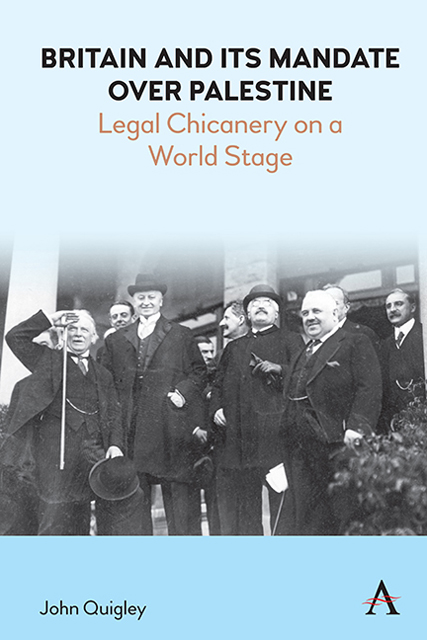Book contents
- Frontmatter
- Contents
- Preface
- Setting the Stage: Was Britain’s Rule in Palestine Legal?
- 1 The Balfour Declaration Is the Focal Point for the Legal Situation of Palestine
- 2 The Balfour Declaration Was a Binding Commitment to the Jewish People
- 3 The Jewish National Home Meant a Jewish State
- 4 The Balfour Declaration Was Issued to Affirm Jewish Rights in Palestine
- 5 The Paris Peace Conference Raised Jewish Statehood to the International Level
- 6 Britain’s Allies Made the Balfour Declaration an International Commitment
- 7 Britain’s Allies Endorsed Jewish Rights
- 8 Britain Took on Palestine Because of the League’s Mandate System
- 9 The League of Nations Protected Palestine’s Arab Population
- 10 Britain Was Given Palestine by the League of Nations
- 11 The League of Nations Put the Palestine Mandate into Legal Force
- 12 The Peace Treaty with Turkey Legalized Britain’s Status in Palestine
- 13 The Palestine Mandate Document Was a Treaty between Britain and the League
- 14 The League of Nations Required Britain to Implement the Balfour Declaration
- 15 The Palestine Mandate Document Implemented the League Covenant
- 16 The Palestine Mandate Document Recognized Jews as a National Group
- 17 The Palestine Mandate Document Bound Britain to the Balfour Declaration
- 18 The International Community Committed Itself to the Balfour Declaration
- 19 Britain Held Legal Status in Palestine
- 20 The United Nations Charter Carried Forward a Jewish Entitlement to Statehood
- Postscript: Why History Matters
- Documents Annex
- Notes
- Bibliography
- Index
7 - Britain’s Allies Endorsed Jewish Rights
Published online by Cambridge University Press: 10 January 2023
- Frontmatter
- Contents
- Preface
- Setting the Stage: Was Britain’s Rule in Palestine Legal?
- 1 The Balfour Declaration Is the Focal Point for the Legal Situation of Palestine
- 2 The Balfour Declaration Was a Binding Commitment to the Jewish People
- 3 The Jewish National Home Meant a Jewish State
- 4 The Balfour Declaration Was Issued to Affirm Jewish Rights in Palestine
- 5 The Paris Peace Conference Raised Jewish Statehood to the International Level
- 6 Britain’s Allies Made the Balfour Declaration an International Commitment
- 7 Britain’s Allies Endorsed Jewish Rights
- 8 Britain Took on Palestine Because of the League’s Mandate System
- 9 The League of Nations Protected Palestine’s Arab Population
- 10 Britain Was Given Palestine by the League of Nations
- 11 The League of Nations Put the Palestine Mandate into Legal Force
- 12 The Peace Treaty with Turkey Legalized Britain’s Status in Palestine
- 13 The Palestine Mandate Document Was a Treaty between Britain and the League
- 14 The League of Nations Required Britain to Implement the Balfour Declaration
- 15 The Palestine Mandate Document Implemented the League Covenant
- 16 The Palestine Mandate Document Recognized Jews as a National Group
- 17 The Palestine Mandate Document Bound Britain to the Balfour Declaration
- 18 The International Community Committed Itself to the Balfour Declaration
- 19 Britain Held Legal Status in Palestine
- 20 The United Nations Charter Carried Forward a Jewish Entitlement to Statehood
- Postscript: Why History Matters
- Documents Annex
- Notes
- Bibliography
- Index
Summary
Even if the San Remo meeting had been the major international event portrayed in the Narrative, the main claim in the Narrative—that at San Remo the Allies endorsed Jewish rights in Palestine—was far from obvious. “At San Remo,” Dore Gold wrote, “Jewish historic rights became Jewish legal rights.”
The Balfour Declaration was on the table at San Remo, but Jewish legal rights did not figure in what was said. Discussion of the Balfour Declaration was initiated at the 24 April 1920 session at San Remo by Britain, which asked that the Balfour Declaration be mentioned in the peace treaty with Turkey. The others seemed puzzled, because end-of-war provisions on the cession of territory do not normally include detail on how a new sovereign will govern. Curzon opened his plea for inclusion of the Balfour Declaration by saying, “His Britannic Majesty's Government had, two years previously, promulgated a formal declaration which had been accepted by the Allied Powers, that Palestine was in future to be the National Home of the Jews throughout the world.” In a hint that Britain was being influenced by the Zionist Organization's lobbying, Curzon added that “the Jews themselves attached a passionate importance to the terms of this declaration,” and that “they would not only be disappointed, but deeply incensed if the pledge given in Mr. Balfour's declaration were not renewed in the terms of the treaty.” Tellingly, in his entreaty to the Allies, Curzon said nothing about Jewish rights.
Nonetheless, the way in which Curzon depicted the Balfour Declaration rattled the Allies. The Balfour Declaration did not say that “Palestine” was to be “the national home.” It said that Britain favored a national home “in” Palestine. Curzon's alteration, whether intentional or not, gave the appearance that a territorial entity was contemplated. The Allies knew what the Balfour Declaration said and what it did not say.
Curzon's statement that the Allies had “accepted” the Balfour Declaration was apparently a reference to statements made by Italy and France that were solicited by the Zionist Organization in 1918. As soon as the Balfour Declaration was delivered to Lord Rothschild, Nahum Sokolow began soliciting statements favorable to Zionism from the Allies.
- Type
- Chapter
- Information
- Britain and its Mandate over PalestineLegal Chicanery on a World Stage, pp. 43 - 50Publisher: Anthem PressPrint publication year: 2022

